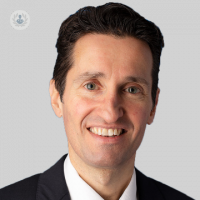Laser eye surgery: Two of the most popular procedures explained by an expert
Written by:Out of the five senses, vision is the most significant. It not only enables us to make sense of the world around us, but it also enables us to take care of ourselves and be safe. In his latest online article, renowned consultant ophthalmologist Mr Aris Konstantopoulos offers his expert insight into both LASIK and SMILE surgery, two of the most popular types of corrective vision surgery.

What are the most common eye disorders?
The most frequent eye disorders that impair human eyesight are:
- Myopia or short-sightedness: This is when objects in the distance cannot be seen clearly
- Hyperopia or long-sightedness: Close-up vision is predominantly affected, whilst long-distance vision can be either normal or reduced.
- Astigmatism: Both near and distant vision are blurred.
- Cataract: A clouding of the natural lens in the eye that reduces the clarity of vision.
Glasses are the simplest way to improve your eyesight if you suffer from one of these disorders, however, they may not have a significant or long-lasting effect if you have cataracts.
Although glasses can be considered a fashion accessory, most people do not like wearing glasses due to the inconvenience of fogging up, cosmesis and peripheral distortion of vision. They usually turn to contact lenses which overcome these limitations but do carry their own risks.
Laser eye surgery procedures have been continuously refined for over thirty years. They are very safe and the vast majority of patients are extremely satisfied with the quality of their vision. Nearly everyone wishes they had had the procedure earlier!
What is the most common type of corrective vision surgery?
The most common technique for correcting vision is called laser-assisted in-situ keratomileusis, or LASIK.
Step 1: The eye surgeon creates a thin flap in the cornea (the clear structure that forms the outer part of the eye) with a femtosecond laser. The flap is then lifted.
Step 2: An excimer laser, a different laser to the one used for the flap, resculpts the cornea, altering its shape and refractive properties. This allows light rays to focus sharply on the retina, providing you with a clear image and sharp vision.
Step 3: The flap is put back in place and once more becomes a vital component of your cornea. The entire process takes no more than thirty minutes.
What is SMILE surgery?
SMILE, or small incision lenticule extraction, is a more recent development in laser eye surgery and an evolution of the use of femtosecond lasers.
Step 1: The femtosecond laser creates a lenticule of tissue, which is a disc-shaped tissue within the cornea. A tiny 3mm entry incision is then created.
Step 2: The surgeon removes the lenticule through this incision.
Step 3: When the lenticule is removed, the cornea's shape and refractive characteristics change, allowing light to focus sharply on the retina and restoring clear vision.
It takes less than 30 minutes to complete the SMILE process on both eyes. By eliminating the requirement for a corneal flap, which is necessary for LASIK, SMILE enables people to receive laser vision correction even if they have thinner corneas, high levels of shortsightedness, or a history of dry eye.
In addition, sports activities and swimming can be resumed earlier than with LASIK.

Which laser eye surgery is better for you?
Before undergoing any laser eye surgery, Aris will examine your eyes to assess your suitability and which procedure is best for you. He will consider several aspects in addition to your eye health, such as your age, lifestyle, general health, and intended goal, to provide you with the best possible solution.
Mr Aris Konstantopoulos is a renowned consultant ophthalmologist based in Southampton. If you would like to book a consultation with Mr Konstantopoulos, you can do so today via his Top Doctors profile.


